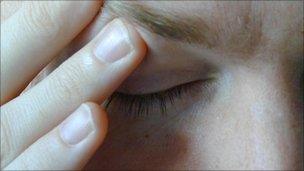Botox 'little help' for migraines
- Published

Chronic migraines can dramatically impair quality of life
There is "limited evidence" for using botox to treat migraine, say experts.
The anti-wrinkle jab, which costs about £276 per injection, has been licensed in the UK and US as a preventative treatment for chronic cases.
But a review of evidence by the Drug and Therapeutics Bulletin said it could not "see a place" for giving botox to migraine sufferers.
Migraine Action said patients should still be given the option of having botox as some had seen improvements.
It is thought around 700,000 people in the UK get chronic migraines.
People can be treated with injections of botox, or botulinum toxin A, on the NHS at their doctor's discretion, if they suffer headaches on at least 15 days a month of which eight days or more are migraine.
The injections are more commonly used for smoothing out wrinkles.
It is not clear how the neurotoxin works in chronic migraines but it is thought that it may block pain signals.
A trial of more than 1,300 patients showed success in reducing the frequency of headaches.
But experts from the Drug and Therapeutics Bulletin, which reviews medical treatments in the UK, questioned the selection of patients in the trial, saying the diagnosis of chronic migraine was incorrect in some.
Botox leads to a worsening of headache symptoms in around one in 10 people, they said, with a similar number developing itching, rash, pain, stiffness and muscle spasms.
"These discrepancies and the limited evidence of benefit make it difficult for us to see a place for botulinum toxin A as treatment for chronic migraine," the authors wrote.
The charity Migraine Action said it was surprised researchers had come to this conclusion, as the treatment had been licensed by both UK and US regulators.
Some patients had reported modest benefits and others a marked improvement - allowing them to go back to work, said director Lee Tomkins.
She added: "Anyone who suffers from chronic migraine knows that there is no cure, but for these patients, who are often quite disabled by their unremitting and remorseless pattern of headaches and migraines, any new treatment that helps them to get their lives back in control and to proactively manage their condition like Botox, gives them hope for a better future.
"Migraine Action believes they should be offered that option."